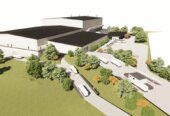
Peter Matthews
Opinion – No Planet B – By Peter Matthews.
Let’s peer into the future for a moment, but before we do, let’s look at some recent events.
Over the past few years there have been a few stories in the news about houses in certain parts of the developed world selling for ridiculously low prices, and I have just seen another one today. In some cases the local authority will practically give you a house if you agree to spend a certain amount of money doing it up – and then undertake to live in it for a certain period of time. Of course the problem is that the newly welcomed residents then have to find gainful employment in their new, often a bit isolated, community. But it’s the lack of economic activity, and therefore employment, which has caused the situation in the first place.
There have been stories in the news about food technology, and how food may very well be ‘grown’ in factories to an almost limitless array of specifications. Management will be able to dial up a run of steak, or flour, or milk to name but a few of the coming possibilities.
It has also been suggested that the bones of some of these factories may already be in existence, in the forms of breweries, dairy factories, and the like. This is because the technologies which will be used to produce food in the not too distant future, ie: micro-fermentation, are similar to what is already done in these existing factories.
Given that the raw material for these processes will be water, microbes, and pretty much any green matter or vegetation, it would make a lot of sense to build these places close to the centres of population. And guess what? That is where they already are.
Of course we will always grow food crops and vegetables, but it makes sense to do that close to the cities too – not so far to transport the product.
Depopulation has been an issue for rural and isolated communities since the industrial revolution, and if what I’ve outlined here is anywhere near what eventually happens, it’s not going to stop any time soon.
In fact I would suggest that as food production becomes centred around areas of concentrated population, there will be less and less reason, apart from recreation, conservation, and education for people to live in or even visit isolated rural areas.
This could be great news for the planet. It would allow for re-wilding of the landscape on a level hitherto not even considered. The environment will eventually heal itself with or without any further input from humans, but imagine what a utopia we could create for the human race and all the species if only we were willing to read the signs which are writ across the landscape even as we drive through it and fly over it.
Well that was a bit extreme wasn’t it? Was it a glimpse into the future or was I dreaming? Time will tell.









